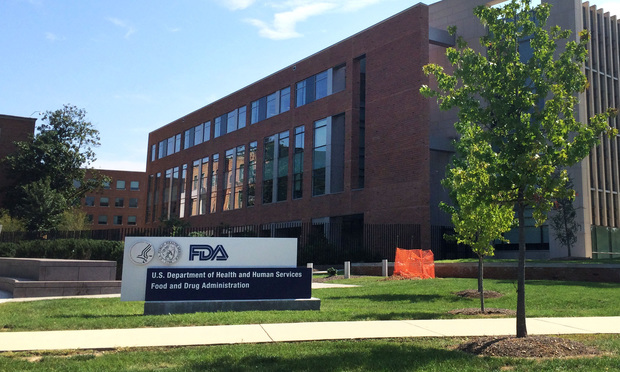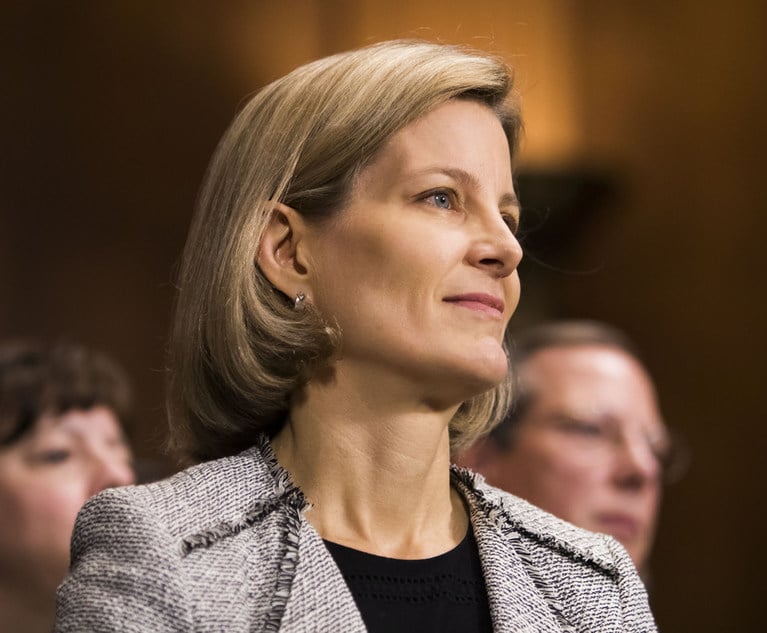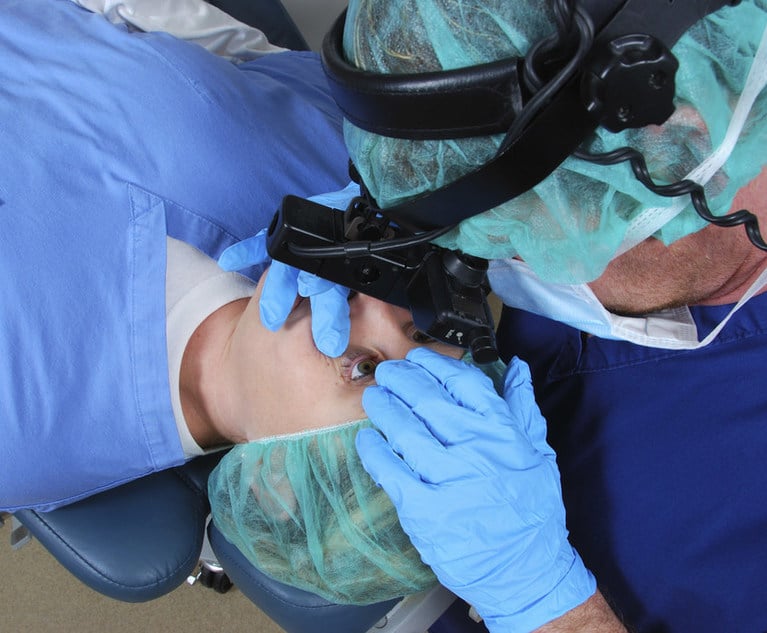In This Pandemic, Let's Nix Business as Usual for Regulatory Approvals
Moving quickly on three recommendations has the potential to save thousands of lives—but the FDA and Congress must act immediately.
April 01, 2020 at 04:32 PM
6 minute read
 U.S. Food and Drug Administration main campus building.
U.S. Food and Drug Administration main campus building.
Currently, there are "no FDA-approved drugs specifically for the treatment of patients with COVID-19," per the Centers for Disease Control and Prevention. There is also no vaccine. But there are antiviral drugs that show promise in tests and actual use. Food and Drug Administration emergency use powers should be exercised to fast-track the approval and use of these drugs. Confidence in accelerated approval will facilitate greater speed in their manufacture, which can and should be assured by the federal government through use of the Defense Production Act.
Leading scientists have predicted dire short-term public health impacts from the spread of the coronavirus, and the resulting COVID-19 disease. The president has said holding U.S. deaths under 100,000 would reflect good efforts. Other estimates are far higher. A reasonable weighing of risks and benefits shows that quick testing, approval and distribution of promising drugs could save hundreds of thousands of lives and help to mitigate the current medical care crisis.
As of March 20, at least 17 different drugs are in various states of development and clinical trials as potential treatments for COVID-19. These include Gilead's Remdesivir, which seeks to interrupt the coronavirus' ability to replicate and is subject to various clinical tests. Roche's Actemra was approved in China for use of treatment of severe complications related to the coronavirus. And beginning March 24, New York started a clinical study of hydroxychloroquine and azithromycin, which showed promise in a small French study.
The Issue of Time
The problem is the proposed time frame for expedited FDA approval of promising antiviral drugs. FDA Commissioner Stephen Hahn on March 19 spoke of the responsibility to ensure products are safe and effective, and that the FDA "wants to do that in the setting of a large pragmatic clinical trial." Such trials, even if accelerated, take months to perform and assess, time we do not have. Aside from existing antiviral medicines that are available now, but that require efficacy testing, the process for new drug approval requires months for clinical trials and assessment of the results. Regular FDA approval takes up to two and a half years, priority review takes six months and even fast-track approvals are 60 days after submission of data.
And after trials, manufacturing could take additional months. Credit Suisse's pharmaceutical team estimated that building stocks of legacy drugs and new drug candidates would take months. In a recent Newsweek piece, Adam Piore reported that Christos Kyratsous, Regeneron's vice president for research, "says it will take about four months to go from picking the most potent antibodies to producing enough cells to provide the tens of thousands of liters of medicine needed to make the drug widely available to those suffering from COVID-19 in the U.S."
There is an alternative, involving three discrete but related legal steps.
Emergency Use Authorization
First, the FDA has authority under Section 564 of the Food, Drug and Cosmetic Act to give emergency use authorization for the production and use of antiviral drugs that show promise in combating the coronavirus.
The FDA has already exercised this authority with respect to protective equipment and testing kits for the coronavirus and should do so for drugs that have shown efficacy and have a record of safe use at appropriate dosing. On March 29, the FDA issued a limited emergency use authorization for chloroquine in treating COVID-19. The FDA can also use this authority for approval of new drugs, if clinical use or smaller-scale trials show efficacy and safety. The same emergency use authority is possible for vaccines that show promise.
Reciprocal Use
Second, Congress should within a few days pass emergency legislation to allow for the reciprocal use in the United States of drugs that receive approval in other countries. Sen. Ted Cruz, R-Texas, has introduced legislation toward that end. To address public concern about the trustworthiness of China, FDA should perform a special review of the safety and efficacy of any new drug permitted into the U.S. only because of use in China.
The Defense Production Act
Third, the president should exercise his emergency powers under the Defense Production Act, which he has already invoked, to take steps to accelerate manufacture and distribution of the drugs receiving emergency or reciprocal approval, so that they are available for actual patient use throughout the country in a matter of weeks, not six months or longer.
The act allows for entering government contracts to prioritize production of such drugs—as well as masks, protective gear and ventilators—over all else. The language of the act allows this because the uncontrolled spread of the virus certainly undermines national security. The act also allows for federal government loans and loan guarantees for manufacturers.
Taking action now is required so that the manufacturing and distribution of antiviral drugs, and later vaccines, starts occurring now.
Without an organized process where the federal government is seen to be urgently taking these steps, doctors and patients will simply reach out to get prescriptions for whichever drugs that are available for off-label use, thereby making them scarcer for other patients who need them.
Under our proposal, we recognize that some patients will be treated with drugs that are not effective. We believe that the risks of not waiting for multiple-month clinical trials are easily outweighed by the benefits of saving lives, and avoiding a catastrophic overloading of the health care system.
Our existing regulatory policy is not built to deal with a pandemic. The structured and careful process for approval of new drugs through clinical trials and staged approval will result in far too limited treatments for the hundreds of thousands or millions of Americans who could be infected over the next several months. Every minute counts. Moving quickly on the three recommendations we've outlined above has the potential to save thousands of lives—but the FDA and Congress must act immediately.
Stuart Singer is a partner at Boies Schiller Flexner who litigates issues of health care policy and teaches public interest law.
John D. Graham is former dean of the Indiana University School of Public and Environmental Affairs, and served as the administrator of the Office of Information and Regulatory Affairs for President George W. Bush.
This content has been archived. It is available through our partners, LexisNexis® and Bloomberg Law.
To view this content, please continue to their sites.
Not a Lexis Subscriber?
Subscribe Now
Not a Bloomberg Law Subscriber?
Subscribe Now
NOT FOR REPRINT
© 2025 ALM Global, LLC, All Rights Reserved. Request academic re-use from www.copyright.com. All other uses, submit a request to [email protected]. For more information visit Asset & Logo Licensing.
You Might Like
View All
'Good Law': DC Judge Denies Hogan Lovells Motion in Big Pharma Dispute
3 minute read
SEC Agrees to Dismiss Civil Suit Against Former Pharma CIO Over Alleged Insider Trading
3 minute read
'Irreparable Harm'?: US Judge Denies Big Pharma Motion to Halt FDA-Approved Generic Drug
3 minute read
As Organ-Transplant Industry Draws Scrutiny, FDA Alleges Eye Bank Accepted Donors With Sepsis
6 minute readLaw Firms Mentioned
Trending Stories
- 1New York-Based Skadden Team Joins White & Case Group in Mexico City for Citigroup Demerger
- 2No Two Wildfires Alike: Lawyers Take Different Legal Strategies in California
- 3Poop-Themed Dog Toy OK as Parody, but Still Tarnished Jack Daniel’s Brand, Court Says
- 4Meet the New President of NY's Association of Trial Court Jurists
- 5Lawyers' Phones Are Ringing: What Should Employers Do If ICE Raids Their Business?
Who Got The Work
J. Brugh Lower of Gibbons has entered an appearance for industrial equipment supplier Devco Corporation in a pending trademark infringement lawsuit. The suit, accusing the defendant of selling knock-off Graco products, was filed Dec. 18 in New Jersey District Court by Rivkin Radler on behalf of Graco Inc. and Graco Minnesota. The case, assigned to U.S. District Judge Zahid N. Quraishi, is 3:24-cv-11294, Graco Inc. et al v. Devco Corporation.
Who Got The Work
Rebecca Maller-Stein and Kent A. Yalowitz of Arnold & Porter Kaye Scholer have entered their appearances for Hanaco Venture Capital and its executives, Lior Prosor and David Frankel, in a pending securities lawsuit. The action, filed on Dec. 24 in New York Southern District Court by Zell, Aron & Co. on behalf of Goldeneye Advisors, accuses the defendants of negligently and fraudulently managing the plaintiff's $1 million investment. The case, assigned to U.S. District Judge Vernon S. Broderick, is 1:24-cv-09918, Goldeneye Advisors, LLC v. Hanaco Venture Capital, Ltd. et al.
Who Got The Work
Attorneys from A&O Shearman has stepped in as defense counsel for Toronto-Dominion Bank and other defendants in a pending securities class action. The suit, filed Dec. 11 in New York Southern District Court by Bleichmar Fonti & Auld, accuses the defendants of concealing the bank's 'pervasive' deficiencies in regards to its compliance with the Bank Secrecy Act and the quality of its anti-money laundering controls. The case, assigned to U.S. District Judge Arun Subramanian, is 1:24-cv-09445, Gonzalez v. The Toronto-Dominion Bank et al.
Who Got The Work
Crown Castle International, a Pennsylvania company providing shared communications infrastructure, has turned to Luke D. Wolf of Gordon Rees Scully Mansukhani to fend off a pending breach-of-contract lawsuit. The court action, filed Nov. 25 in Michigan Eastern District Court by Hooper Hathaway PC on behalf of The Town Residences LLC, accuses Crown Castle of failing to transfer approximately $30,000 in utility payments from T-Mobile in breach of a roof-top lease and assignment agreement. The case, assigned to U.S. District Judge Susan K. Declercq, is 2:24-cv-13131, The Town Residences LLC v. T-Mobile US, Inc. et al.
Who Got The Work
Wilfred P. Coronato and Daniel M. Schwartz of McCarter & English have stepped in as defense counsel to Electrolux Home Products Inc. in a pending product liability lawsuit. The court action, filed Nov. 26 in New York Eastern District Court by Poulos Lopiccolo PC and Nagel Rice LLP on behalf of David Stern, alleges that the defendant's refrigerators’ drawers and shelving repeatedly break and fall apart within months after purchase. The case, assigned to U.S. District Judge Joan M. Azrack, is 2:24-cv-08204, Stern v. Electrolux Home Products, Inc.
Featured Firms
Law Offices of Gary Martin Hays & Associates, P.C.
(470) 294-1674
Law Offices of Mark E. Salomone
(857) 444-6468
Smith & Hassler
(713) 739-1250








